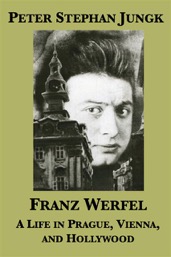 $9.99 on Kindle
$9.99 on Kindle(cover by Susan Erony)
Franz Werfel: A Life in Prague, Vienna, and Hollywood by Peter Stephan Jungk (translated from the German by Anselm Hollo; 133,000 words and 40 illustrations)
Czech-born playwright, novelist and poet Franz Werfel (1890-1945) became internationally famous(and a special target of the Nazis) after he wrote The Forty Days of Musa Dagh, the first novel about the Armenian Genocide. He later published the Catholic classic The Song of Bernadette, written after a deeply religious experience in Lourdes, a stop on his escape route to the United States through occupied France.
Born into a wealthy family of Prague Jews, Werfel was torn between his Jewish identity and his attraction to Catholicism, between high art and popular success. He was friends with Franz Kafka and Max Brod in his youth and later and part of a larger Central European intellectual circle that included Sigmund Freud and Martin Buber. He married Alma Schindler-Mahler-Gropius (widow of composer Gustav Mahler and ex-wife of Bauhaus architect Walter Gropius). The couple fled Nazi-occupied Vienna in 1938 and became part of the German exile community of California. They lived in Beverly Hills where Werfel died, a successful Hollywood screenwriter.
“This lovely book is more than a biography — a meditation on art, history and human life.” — John Simon, New York Times Book Review
“An exemplary biography.” Edward Timms, The Times Literary Supplement
“Jungk’s description of how he researched his subject is highly suspenseful and reads like a detective story.” — Der Spiegel
“This exemplary biography recalls Werfel’s career and its vanished settings as part of the cultural history of the West. Mr. Jungk also provides a searing picture of Werfel’s wife, the famous Alma Mahler Gropius Werfel...” — The New Yorker
“This biography, ostensibly the story of a life, is really a broad panorama of culture and history... It is Jungk’s genius to seduce us into following him into Werfel’s world, and to keep us there, completely enthralled.” — Die Welt



